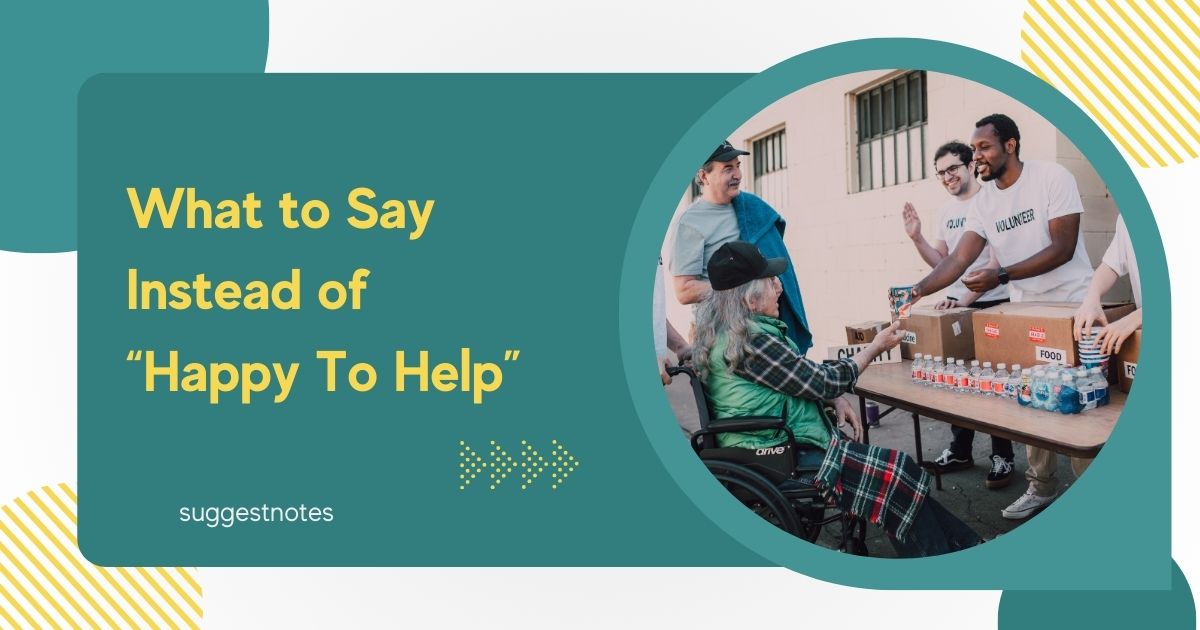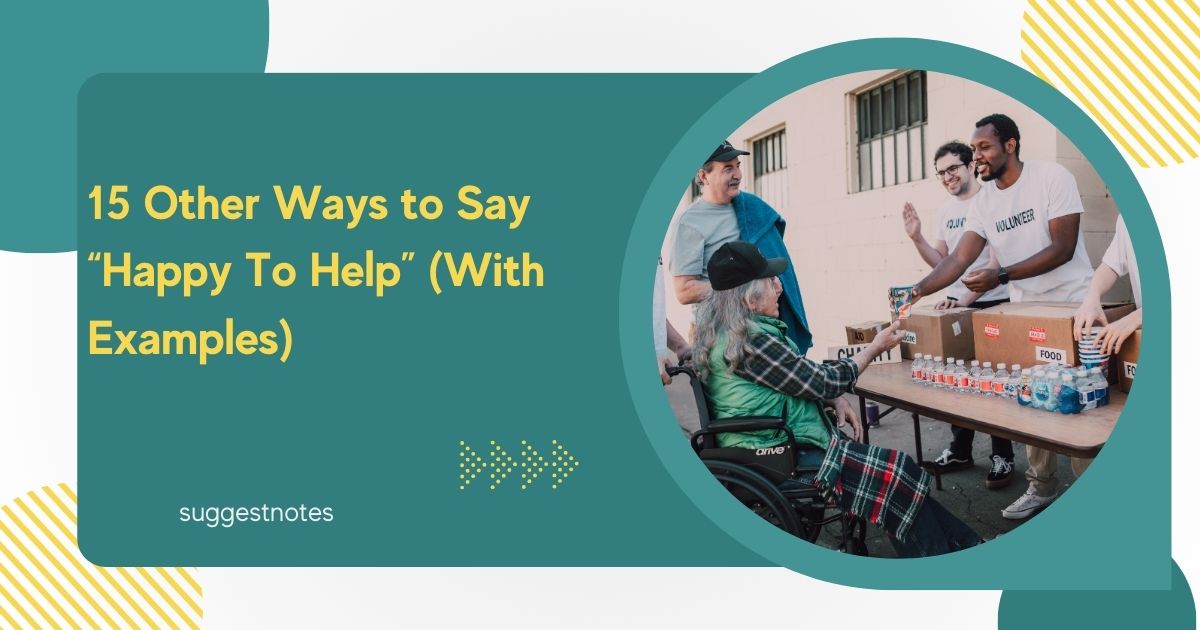Saying “Happy To Help” is a polite and friendly way to respond when someone appreciates your assistance. However, if you keep saying it over and over, your replies may start sounding repetitive or less genuine.
To keep your conversations lively and show your eagerness to assist in new ways, it’s good to mix things up a bit. In this article, we’ll dive into 15 different ways to say “Happy To Help” that add a bit of flair to your responses.
These fresh alternatives, complete with examples, will help you express your willingness to assist in a way that feels more authentic and engaging.
Is It Professional to Say “Happy to Help”?
Using “happy to help” in professional settings is generally appropriate. It shows that you are friendly and willing to assist others.
However, while it conveys positivity, relying solely on this phrase may make your communication feel repetitive and uninspired. It’s helpful to have a variety of responses at your disposal.
By varying your expressions, you can maintain professionalism while keeping conversations engaging. For example, if a coworker asks for help with a task, saying “I’m happy to help” is fine.
But changing it to “I’m pleased to support your project” adds a personalized touch. This approach fosters better relationships and enhances the overall quality of your interactions.
What to Say Instead of “Happy To Help”

Here are 15 alternatives to “happy to help.” Each phrase allows you to express your willingness to assist while making the conversation more lively.
- Glad to Assist
- Pleased to Be of Service
- Delighted to Support
- Joyful to Contribute
- Thrilled to Aid
- Eager to Assist
- Cheerful to Offer Help
- Content to Lend a Hand
- Enthusiastic to Be of Use
- Gratified to Help
- More Than Happy to Assist
- More than Willing to Help
- Happy to Lend My Expertise
- Always Here to Support
- At Your Service
1. Glad to Assist
“Glad to assist” is a friendly and casual way to convey your joy in helping someone. It shows you are ready and willing to support others.
For instance, if a coworker needs help with a project, you might say, “I’m glad to assist you with that.” This phrase adds warmth and makes the other person feel valued.
2. Pleased to Be of Service
“Pleased to be of service” has a slightly more formal tone, often used in customer service or professional contexts. It implies satisfaction in being able to meet someone’s needs.
For example, after resolving a customer’s issue, a support agent might conclude with, “I’m pleased to be of service and glad we could resolve this for you.” This reassurance emphasizes the importance of customer satisfaction.
3. Delighted to Support
Using “delighted to support” adds a touch of enthusiasm to your willingness to help. This phrase shows that you are not just willing but also excited about the opportunity to assist.
For example, if a colleague seeks your help with a presentation, you could say, “I’m delighted to support you with your presentation; let’s brainstorm some ideas together.” This expression fosters a collaborative spirit.
4. Joyful to Contribute
“Joyful to contribute” expresses genuine happiness in being able to help others. This phrase suggests that you find fulfillment in assisting.
For example, if a friend is organizing an event, you might say, “I’m joyful to contribute to your event planning; let me know how I can help.” This conveys a sense of camaraderie and eagerness to support.
5. Thrilled to Aid
“Thrilled to aid” is an energetic way to express your willingness to help. It conveys excitement about the assistance you provide. If a colleague faces a challenge, you might respond,
“I’m thrilled to aid you in solving this issue. Together, we can find a great solution.” This expression can uplift those you assist.
For example, when a friend is planning a community event, you might say, “I’m excited to help out however I can to make this event great.” This shows your enthusiasm and eagerness to support their efforts.
6. Eager to Assist
When you say “eager to assist,” it highlights your readiness and enthusiasm to help. This phrase suggests you are actively looking forward to offering help.
For example, during a busy workweek, if someone asks for your expertise, you might say, “I’m eager to assist you with this matter. Let’s tackle it right away.” This communicates a proactive approach.
7. Cheerful to Offer Help
“Cheerful to offer help” conveys a positive and upbeat attitude. This phrase can make your offers sound more inviting.
For instance, if a neighbor needs assistance with their groceries, you could say, “I’m cheerful to offer help with your groceries; I’ll give you a hand.” This expresses a friendly willingness to help in everyday situations.
8. Content to Lend a Hand
Being “content to lend a hand” indicates a willingness to help without feeling burdened. This phrase reflects satisfaction in being helpful.
For example, if a friend is moving, you might say, “I’m content to lend a hand with your move; just let me know what you need.” This shows that you find joy in assisting others without feeling like it’s an obligation.
9. Enthusiastic to Be of Use
“Enthusiastic to be of use” expresses a lively eagerness to assist. This phrase adds an energetic vibe to your willingness to help. If a teammate is working on a project, you could say, “I’m enthusiastic to be of use in this project; let’s make it great together.” This communicates a strong desire to collaborate and succeed.
For example, when a friend talks about starting a new project, you might say, “I’m excited to help with your project. Let’s think of some ideas together!” This shows your eagerness and willingness to assist.
10. Gratified to Help
When you say “gratified to help,” it shows you derive pleasure from assisting others. This phrase conveys appreciation for the opportunity to be of service.
For example, if you mentor someone at work, you might express, “I’m gratified to help you develop your skills; it’s rewarding to see your progress.” This communicates a deeper connection and acknowledgment of growth.
11. More Than Happy to Assist
Saying “more than happy to assist” emphasizes your strong willingness to help. This phrase indicates that you genuinely want to provide support beyond just being agreeable.
For example, after helping a colleague meet a deadline, you might say, “I’m more than happy to assist with this; your success is important to me.” This phrase builds rapport and shows you care.
12. More than Willing to Help
Expressing that you are “more than willing to help” suggests an eagerness to go above and beyond for others. This phrase reflects commitment.
For instance, if a friend is facing a tough situation, you could say, “I’m more than willing to help you through this; just let me know what you need.” This expression shows loyalty and support.
Related Guide:
15 Other Ways to Say “I’m happy for you” (with Examples)
13. Happy to Lend My Expertise

Using “happy to lend my expertise” emphasizes your skill set while offering help. This phrase highlights your confidence in assisting.
For example, if a colleague seeks advice on a project, you might say, “I’m happy to lend my expertise in this area; I can share some strategies that have worked for me.” This adds value to your assistance.
14. Always Here to Support
The phrase “always here to support” emphasizes your constant availability for assistance. This phrase reassures others of your presence.
For example, if a friend is feeling down, you could say, “I’m always here to support you; don’t hesitate to reach out whenever you need someone.” This expression provides comfort and stability.
15. At Your Service
Saying “at your service” is a polite and formal way to express your readiness to help. This phrase can feel warm and respectful.
For instance, if a customer asks for help with an order, you could say, “I’m at your service and happy to help you with your order.” This shows professionalism and respect for their needs.
FAQ’s
Is saying “Happy To Help” considered polite in customer service?
Yes, using “Happy To Help” is seen as polite and friendly in customer service. It shows customers that you genuinely care about assisting them.
What does “Happy To Help” mean in a professional setting?
In a professional setting, “Happy To Help” means you’re willing and ready to assist others. It expresses a positive attitude toward providing support.
Are there formal alternatives to “Happy To Help”?
Yes, alternatives like “Pleased to be of service” or “Glad to assist” can be used instead of “Happy To Help” for a more formal tone.
Can “Happy To Help” be used in emails?
Yes, “Happy To Help” is suitable for emails as it adds a friendly touch. It makes your willingness to help clear in written communication.
Does “Happy To Help” work in non-work situations?
Absolutely! “Happy To Help” can be used with friends or family. It shows that you’re ready to lend a hand whenever needed.
Conclusion
Using phrases like “Happy To Help” goes a long way in making your communication feel friendly and supportive. It shows a willingness to assist and creates a positive tone, whether in personal interactions or professional settings. However, sometimes you may want to switch things up to keep your responses fresh or more aligned with a particular situation. By using alternatives to “Happy To Help”, you can make your responses more meaningful and adapt to different contexts, adding a personal touch.
Incorporating expressions like “Glad to assist” or “Thrilled to aid” helps you convey the same helpful attitude while bringing variety to your language. When you use different phrases that mean “Happy To Help”, it not only keeps conversations engaging but also demonstrates your genuine enthusiasm for supporting others. Ultimately, whether you stick to “Happy To Help” or try different expressions, the key is to communicate your willingness to help in a way that feels natural and sincere.

As a content writer with five years of experience, I focus on creating insightful and impactful website content that drives engagement and boosts search visibility. With a strong foundation in SEO and digital marketing, I excel at crafting compelling narratives that resonate with audiences and enhance brand storytelling. My passion for data-driven content creation allows me to deliver pieces that not only inform but also inspire action. Whether through blog posts, web copy, or informative articles, I strive to empower businesses to connect authentically with their customers.







